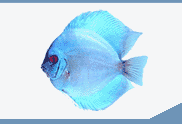

 |
||||||||||||
 |
||||||||||||
| Keeping Discus for Beginners | ||||||
| Ardan Huck | March 14, 2002. | |||||
There are many things to keep in mind with discus that are different from other cichlids. They like warmer water, mid-80s Fahrenheit. They like lots of clean fresh, water and lots of water changes. I do 50% a day, some do 30% three times a week. They like to be in groups of about 6 or 8 (a 50 gallon is a good size tank). They don't do well with other fish in the tank (there are a few exceptions). It is easier to keep the tank clean if it has no gravel. Don't use carbon in the filter (this can lead to disease in discus). Never put new discus in with old discus without keeping them separated (quarantined) for a while to make sure they are not sick and affect the other fish. One of the most important things is to get from a reliable source. A good breeder will have healthy fish and good customer service (answer all questions, help with problems, even after the purchase). A variety of food is good. I use flakes, live blackworms (from a good source, i.e. clean worms), some safe frozen foods like Hikari (sterilized) blood worms, some pellets (soak before using to prevent swelling up in the stomach), and frozen beef heart. Keeping things stable is important. Don't add chemicals except to remove chlorine/chloramine. Messing with pH is usually not necessary. Age water, that is, put the water that you want to use for the aquarium in a barrel a day before you want to use it for water changes. Use good aeration and set a heater at the tank temperature in the barrel. This is done if the pH of the tap water is not stable (if you check pH out of the tap, then let the water sit overnight and check the pH again and its different). One other note. If you see a picture of a discus that you would like to have, show that picture or send an email with that picture to the breeder so they can do their best to give you what you want. You have to remember little fish may grow up to look different, especially if it comes from cross-breeding two or more kinds of discus. It could look like the male, or the female, or a combination, or even like one of the fish farther back in the breeding sequence (like the grandparents may be a different type). Ask the breeder what the possibilities are, or buy grown fish. |
 |
|||||
| About Us :: Message Board :: Chat | |||||
| Library :: Photo Gallery :: Links & Resources :: Breeders & Sponsors :: Merchandise | |||||
| Website designed by: EthanCote.com | © 2001-2004, SimplyDiscus.com. All Rights Reserved. | ||||